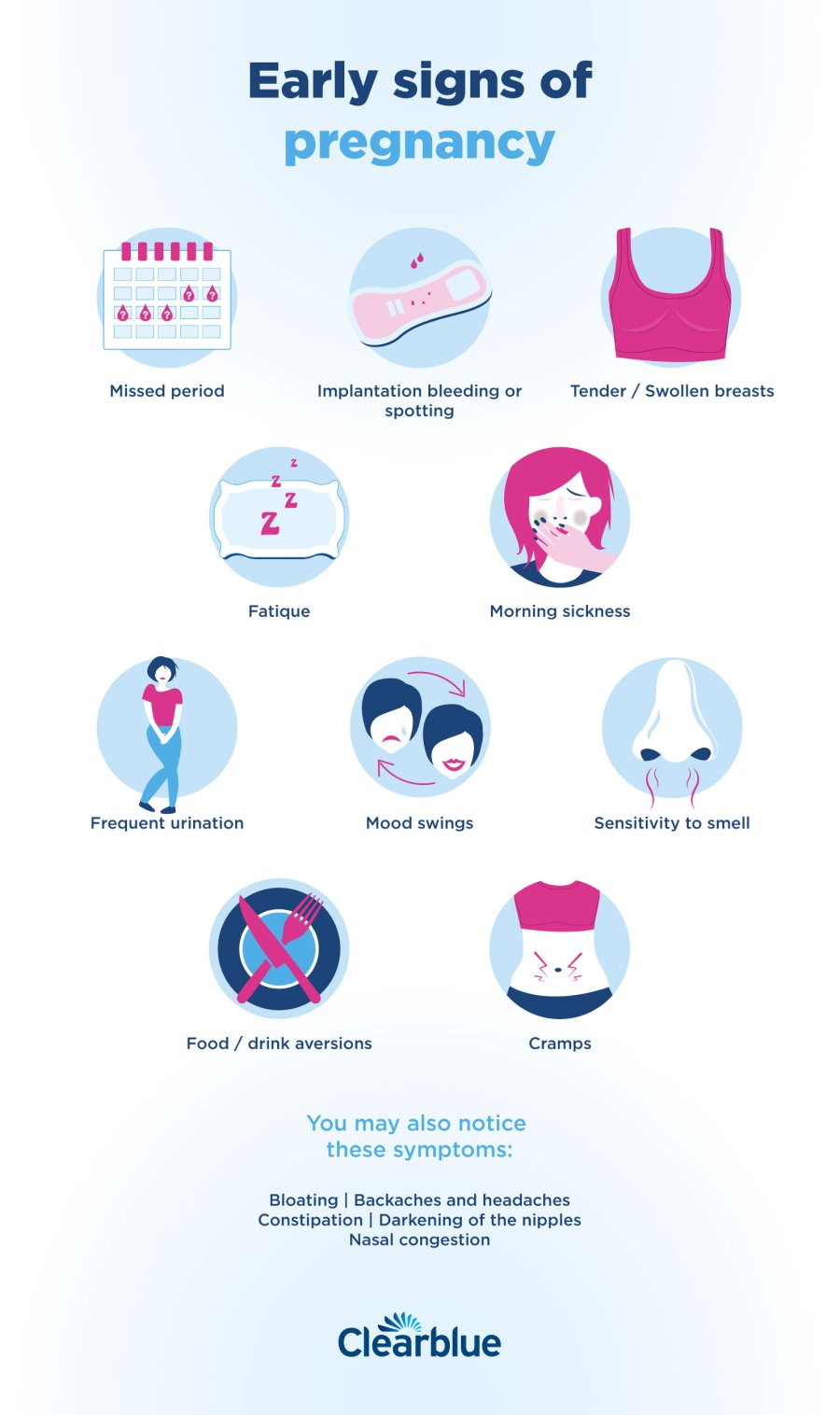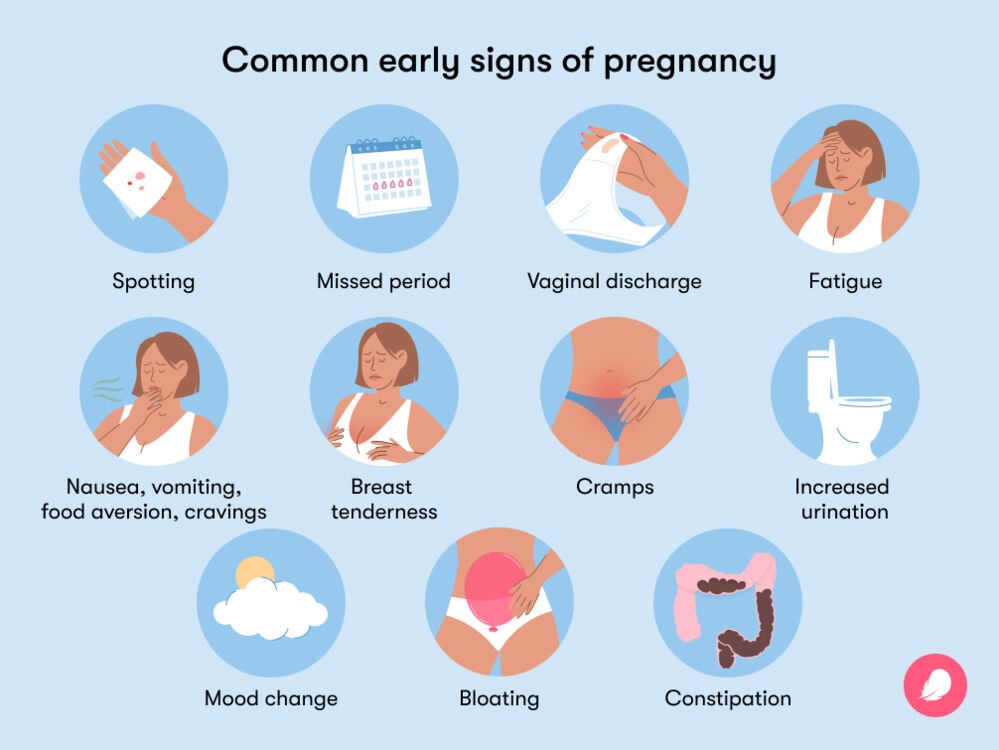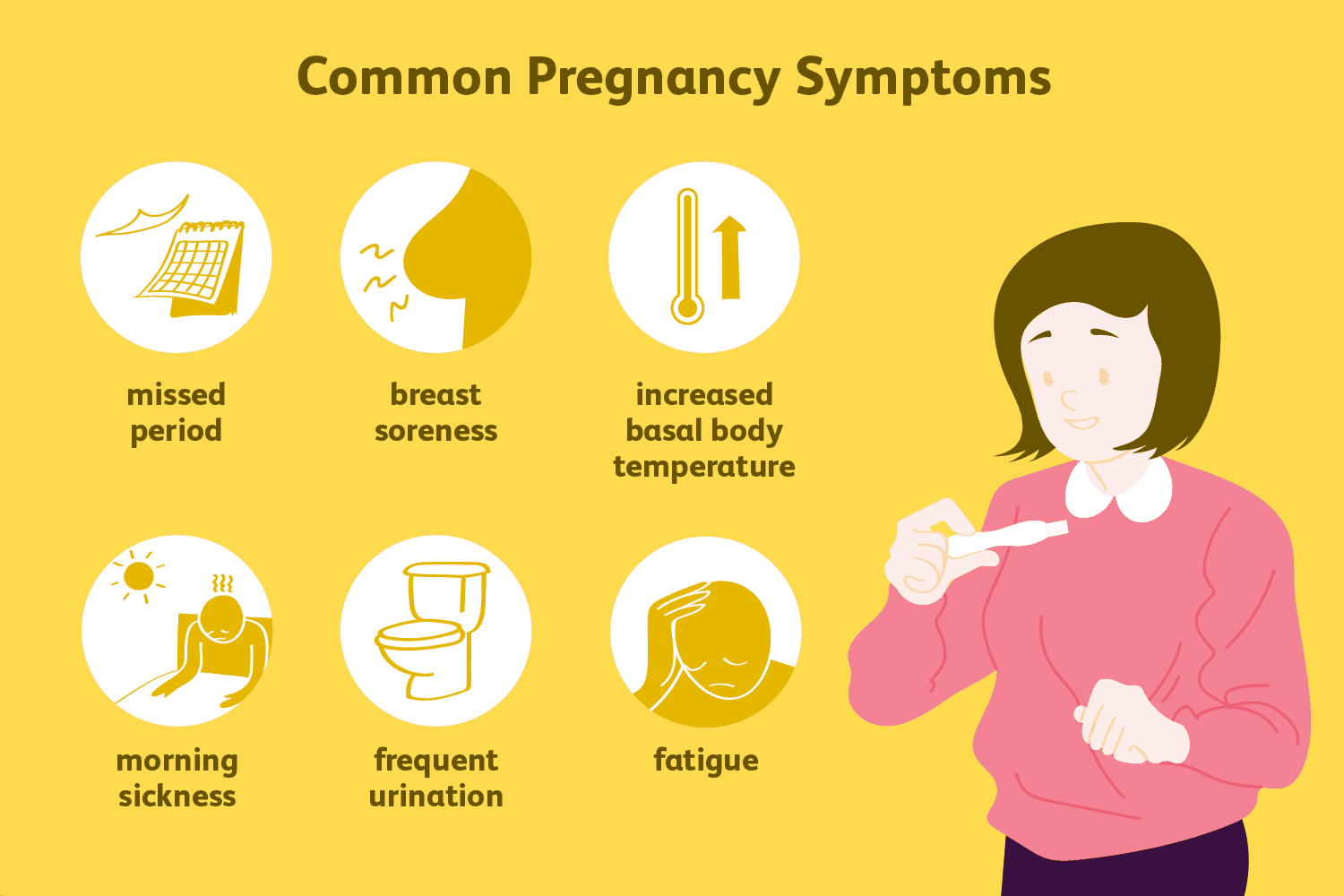Pregnancy symptoms vary among women but often include missed periods, nausea, fatigue, and breast tenderness. These signs typically appear within the first few weeks after conception.
Pregnancy is a significant life event, often marked by a mix of excitement and uncertainty. Recognizing early symptoms is crucial for timely medical care and lifestyle adjustments. Many women experience a range of physical and emotional changes during this period.
Common symptoms such as morning sickness and fatigue can start as early as the first month. Understanding these signs helps you prepare for the journey ahead. Early detection allows for better prenatal care, ensuring a healthier pregnancy for both mother and baby. Staying informed about pregnancy symptoms empowers women to seek guidance and support when needed.
Introduction To Pregnancy Symptoms
Pregnancy is a beautiful journey. It brings many changes to a woman’s body. Recognizing pregnancy symptoms early can help in understanding this process. These signs can vary from person to person. Knowing what to expect is important for every expectant mother.
The Importance Of Recognizing Early Signs
Early pregnancy symptoms can be subtle but significant. Recognizing these signs can help you:
- Confirm a pregnancy sooner.
- Prepare for medical appointments.
- Make healthy lifestyle choices.
- Manage emotional changes better.
Some common early symptoms include:
- Missed period
- Nausea or vomiting
- Frequent urination
- Fatigue
Understanding these symptoms allows for better care. Each symptom can indicate different stages of pregnancy. Not all women experience the same symptoms. Some may have more intense feelings, while others may notice very few signs.
When To Consult A Healthcare Professional
If you suspect pregnancy, consider consulting a healthcare professional. Seek medical advice if you experience:
- Severe abdominal pain
- Heavy bleeding
- Extreme fatigue
- Persistent vomiting
Early consultation can ensure the health of both mother and baby. A healthcare provider can offer guidance and support. They will monitor your progress throughout the pregnancy.
Stay informed and proactive. Early detection of symptoms leads to better care.
Missed Period
A missed period is often the first sign of pregnancy. For many women, this is an exciting moment. It can signal new beginnings and hope. Yet, it can also bring anxiety. Understanding why periods are missed is important.
Connecting The Dots: Menstrual Cycle Variability
Menstrual cycles can vary greatly from woman to woman. The average cycle lasts about 28 days. However, cycles can range from 21 to 35 days. Several factors can affect this variability:
- Stress: High stress levels can delay ovulation.
- Weight Changes: Gaining or losing weight can impact cycles.
- Exercise: Intense workouts can disrupt normal cycles.
- Health Conditions: Conditions like PCOS can cause irregularities.
It’s crucial to track your cycle. Apps and calendars can help. This way, you’ll notice any changes quickly.
Exceptions To The Rule
Some women may miss their period for reasons other than pregnancy. Here are some common exceptions:
| Reason | Description |
|---|---|
| Hormonal Imbalance | Fluctuations in hormones can cause missed periods. |
| Medications | Certain medications may affect menstrual cycles. |
| Menopause | Approaching menopause can lead to irregular periods. |
| Illness | Severe illness can disrupt normal cycles. |
Each woman’s body is unique. Tracking changes helps in understanding your health better. If you miss a period, consider other factors. Consult a healthcare provider for accurate information.
Nausea And Vomiting
Nausea and vomiting are common symptoms during pregnancy. Many women experience these issues, often referred to as morning sickness. The intensity can vary. Some may feel mild nausea, while others face severe vomiting.
The Onset Of Morning Sickness
Morning sickness can start as early as four weeks into pregnancy. Most women notice symptoms around six weeks. Symptoms usually peak between eight and twelve weeks. Many women feel relief by the second trimester.
- Common triggers include:
- Strong smells
- Certain foods
- Stress
Coping Strategies And Remedies
Managing nausea and vomiting can be challenging. Here are some effective coping strategies:
- Eat small meals: Frequent, small meals help settle the stomach.
- Stay hydrated: Drink water throughout the day.
- Ginger: Ginger tea or ginger candies can soothe nausea.
- Avoid triggers: Steer clear of strong odors and foods that upset your stomach.
- Rest: Ensure you get enough rest and reduce stress.
Consult a healthcare provider for severe symptoms. They may recommend safe medications or alternative treatments.
| Remedy | Description |
|---|---|
| Ginger | Natural remedy known to ease nausea. |
| Acupressure | Pressure on certain points may relieve nausea. |
| Vitamin B6 | May help reduce nausea for some women. |

Credit: www.clearblue.com
Breast Changes
Pregnancy brings many changes to a woman’s body. One of the most noticeable changes occurs in the breasts. These changes prepare the body for breastfeeding. Understanding these changes can help expectant mothers feel more comfortable.
Tenderness And Swelling
During early pregnancy, many women experience breast tenderness. This sensitivity is caused by hormonal changes. Swelling often accompanies this tenderness. Here are some key points about tenderness and swelling:
- Hormones: Increased levels of estrogen and progesterone.
- Size: Breasts may grow one to two cup sizes.
- Veins: Breasts may look larger and more visible.
- Areolas: Darkening of the areolas is common.
Many women notice these changes by the end of the first trimester. These changes can feel uncomfortable but are normal.
The Evolution From Conception To Postpartum
The journey of breast changes starts at conception. Here’s a brief timeline of what to expect:
| Stage | Changes |
|---|---|
| First Trimester | Tenderness, swelling, and darkening of the areolas. |
| Second Trimester | Continued growth and development of milk ducts. |
| Third Trimester | Production of colostrum begins, preparing for breastfeeding. |
| Postpartum | Breasts may feel fuller as milk comes in. |
Each stage presents unique changes. These changes signal the body’s readiness for nurturing a newborn. It’s essential to embrace these transformations. They are part of a beautiful journey into motherhood.
Increased Urination
Pregnancy brings many changes, including increased urination. Frequent bathroom trips can be surprising. This symptom often starts in early pregnancy and continues throughout. Understanding the reasons behind this can help ease concerns.
Understanding The Hormonal Shifts
During pregnancy, your body undergoes significant hormonal changes. These changes impact various systems, including the urinary system.
- Human Chorionic Gonadotropin (hCG): This hormone increases early in pregnancy. It can cause more frequent urination.
- Progesterone: This hormone relaxes muscles. It can affect the bladder and lead to increased urination.
- Estrogen: Higher levels of estrogen can also stimulate urination. This hormone promotes blood flow to the pelvic area.
As your pregnancy progresses, the growing uterus puts pressure on the bladder. This pressure leads to more trips to the bathroom.
Managing Increased Bathroom Breaks
Frequent urination can disrupt daily activities. Here are some tips to manage this symptom:
- Stay Hydrated: Drink enough water. Avoid dehydration but limit fluids before bed.
- Plan Bathroom Breaks: Schedule trips to the bathroom. This can help reduce accidents.
- Wear Comfortable Clothing: Loose-fitting clothes can make bathroom trips easier.
- Practice Kegel Exercises: Strengthening pelvic muscles can help control urination.
Understanding and managing increased urination can make pregnancy more comfortable. Remember, this symptom is common and often temporary.

Credit: flo.health
Fatigue And Tiredness
Pregnancy brings many changes, and fatigue is one of the most common symptoms. Tiredness can feel overwhelming during this special time. Many women experience fatigue, especially in the first and third trimesters. Understanding its causes can help you manage it better.
The Role Of Progesterone
One major cause of fatigue during pregnancy is progesterone. This hormone rises significantly. It prepares the body for pregnancy and supports the growing fetus.
- Increased Sleepiness: Progesterone can make you feel sleepy.
- Reduced Energy: It slows down metabolism and energy production.
- Body Changes: Your body is working hard to support the baby.
These hormonal changes can lead to feelings of tiredness. It’s essential to listen to your body and take breaks as needed.
Energy Management Tips
Managing fatigue is crucial for a healthy pregnancy. Here are some effective tips:
- Rest Regularly: Take short naps or rest periods.
- Stay Hydrated: Drink plenty of water throughout the day.
- Eat Nutrient-Rich Foods: Focus on fruits, vegetables, and whole grains.
- Light Exercise: Gentle activities like walking can boost energy.
- Prioritize Sleep: Aim for 7-9 hours of sleep each night.
Implementing these tips can help you manage fatigue effectively. Remember, it’s okay to seek support from family or friends. They can help with daily tasks.
Mood Swings
Mood swings are common during pregnancy. Hormonal changes cause these emotional shifts. Expecting mothers may feel happy one moment and sad the next. Understanding this is essential for partners and families.
Emotional Rollercoaster Of Early Pregnancy
Early pregnancy brings many changes. These changes affect emotions significantly. Here are some reasons for mood swings:
- Hormonal changes: Increased hormones like progesterone and estrogen.
- Physical changes: Fatigue, nausea, and body aches impact mood.
- Stress: Concerns about the baby and future can overwhelm.
Women may experience:
- Extreme happiness.
- Sudden irritability.
- Frequent crying spells.
These feelings can be confusing. Understanding these emotions is vital for coping.
Support Systems And Self-care
Having a strong support system helps manage mood swings. Family and friends play a crucial role. Here are some ways to create a supportive environment:
- Communicate feelings openly with loved ones.
- Seek help from a counselor or therapist.
- Join a support group for expecting mothers.
Self-care practices also help improve mood:
| Self-Care Practice | Description |
|---|---|
| Exercise | Engage in light activities like walking or yoga. |
| Healthy Eating | Consume balanced meals rich in nutrients. |
| Rest | Take naps and ensure enough sleep each night. |
Taking care of oneself leads to better emotional health. Managing stress effectively can lessen mood swings.

Credit: www.cdc.gov
Food Aversions And Cravings
Pregnancy brings many changes. One of the most surprising can be food aversions and cravings. Expecting mothers often find their taste buds changing. Foods they once loved can suddenly seem unappealing. Meanwhile, strange cravings can emerge. Understanding these shifts is important for a healthy pregnancy.
Deciphering New Taste Preferences
Pregnant women may experience new taste preferences. Some common aversions include:
- Meat
- Certain vegetables
- Dairy products
Cravings can be equally puzzling. Many women crave:
- Pickles
- Ice cream
- Chocolates
These changes can happen for various reasons. Hormonal shifts play a significant role. Sensitivity to smells may increase, causing aversions. Understanding these changes can help manage expectations.
Nutritional Balance Amidst Changing Appetites
Maintaining a nutritional balance is crucial during pregnancy. Despite cravings, focus on healthy foods. Here are some strategies:
- Prioritize fruits and vegetables.
- Include whole grains for energy.
- Opt for lean proteins.
Stay hydrated. Drink plenty of water throughout the day. Consider healthy snacks, such as:
| Snack Option | Nutritional Benefit |
|---|---|
| Greek yogurt | Rich in protein and calcium |
| Nuts | Healthy fats and vitamins |
| Fruit smoothies | High in vitamins and hydration |
Listen to your body. It’s okay to indulge in cravings occasionally. Balance is key to a healthy pregnancy.
Heightened Sense Of Smell
Pregnancy brings many changes, one of the most surprising being a heightened sense of smell. This shift can start in the first trimester. Women often notice scents they never paid attention to before.
Some odors may become overwhelming. Others can trigger nausea or strong cravings. Understanding this change helps expectant mothers navigate their new world.
Navigating A World Of Intensified Scents
During pregnancy, smells can feel stronger. Everyday scents may become intense. Here are some common odors that can be affected:
- Food aromas
- Perfumes and colognes
- Cleaning products
- Pet odors
- Smoke
These scents can evoke different reactions. Some women feel sensitive or even nauseous. Others may find comfort in familiar smells. This sensitivity often varies throughout pregnancy.
The Impact On Daily Life
The heightened sense of smell can change daily routines. Expecting mothers might need to adjust their environment.
| Situation | Possible Solutions |
|---|---|
| Cooking odors | Cook with windows open or use exhaust fans |
| Strong perfumes | Avoid crowded places with heavy fragrances |
| Cleaning products | Choose natural or scent-free options |
| Pet smells | Clean litter boxes or pet areas frequently |
These changes can promote a more comfortable environment. Expectant mothers may also find it helpful to communicate their needs. Friends and family can offer support during this time.
Understanding the heightened sense of smell helps in navigating this unique experience. It plays a significant role in how a woman feels during pregnancy.
Frequently Asked Questions
What Are The Early Signs Of Pregnancy?
Common early signs include missed periods, nausea, fatigue, and breast tenderness. These symptoms can vary by individual.
How Soon Can Pregnancy Symptoms Appear?
Pregnancy symptoms may appear as early as one week after conception, but they typically become noticeable around the missed period.
Is Cramping Normal In Early Pregnancy?
Mild cramping can be normal due to the uterus expanding, but severe pain should be discussed with a healthcare provider.
Can Pregnancy Symptoms Be Similar To Pms?
Yes, pregnancy symptoms often mimic PMS, including bloating, mood swings, and breast sensitivity, making them easy to confuse.
What Is Implantation Bleeding?
Implantation bleeding occurs when a fertilized egg attaches to the uterine lining, resulting in light spotting around 6-12 days post-conception.
Do Pregnancy Symptoms Worsen Over Time?
Some symptoms may intensify during the first trimester, but they often improve as the pregnancy progresses into the second trimester.
Can Stress Affect Pregnancy Symptoms?
Stress can exacerbate pregnancy symptoms like fatigue and mood swings, but it doesn’t directly cause pregnancy-related changes.
When Should I Consult A Doctor About Symptoms?
Consult a doctor if symptoms are severe, unusual, or accompanied by heavy bleeding or intense pain for proper evaluation.
Conclusion
Pregnancy symptoms can vary widely among individuals. Recognizing these signs early can help you prepare for this life-changing journey. From nausea to fatigue, each symptom plays a role in your body’s adjustment. Stay informed and consult your healthcare provider for support.
Embrace this unique experience with knowledge and care.




